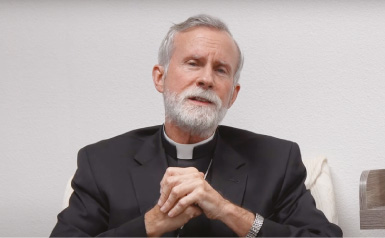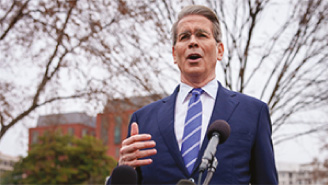by Ricky Rodas for Yes! Magazine.
When Cecilia González told family members she had volunteered to share her life story with men in prison, they were shocked.
González, 56, had spent most of her adult life recovering from the pain and trauma of childhood abuse and domestic violence. She has a loving family and a stable marriage of 25 years. Her family couldn’t understand why she would want to talk to the kind of person she’d spent her life trying to escape.
But for González, sharing her story was a way to bring her healing journey full circle. After years of perseverance, she’d established herself as a community services manager for House of Ruth, a nonprofit organization based in Pomona, California. Every day, she helps survivors wrestle with similar challenges to the ones she’s faced.
When she received an invitation to speak at the California Institution for Men, a prison in the city of Chino, California, in August, she saw a new opportunity to help interrupt the cycle of domestic and sexual violence: talking directly with people who have caused harm.
“I know that change is possible,” González says. “It’s good when somebody is able to tell you that a life without violence and any type of abuse in the home is possible.”
The panel was organized by a program called the Victim Offender Education Group. Founded by Insight Prison Project, the program provides rehabilitation activities for men at the California Institution for Men. The curriculum is grounded in principles of restorative justice, commonly defined as an alternative to punitive justice that promotes healing for the person who was harmed, the person who carried out the harm, and the communities they both belong to.
Although the group was not created specifically for people involved in domestic violence and intimate partner violence, it has increasingly focused on serving this population as it became clear that many program participants had committed these types of crimes, said Rev. Nora Jacob, a minister at Covina Community Church and program lead in restorative justice at the prison.
Jacob has been organizing education groups in prison settings since 2014 and has facilitated the rehabilitation of several cohorts of men who have committed a variety of crimes, including domestic violence and intimate partner violence. A two-hour session is held once per week and consists of a mix of readings and empathy-building exercises. Participants spend time sharing and self-reflecting on the decisions and circumstances that led to their incarceration.
“People come out changed,” Jacob says. At the introductory meeting, she tells participants: “We are asking you to share as much as you’re willing to share, and we are going to ask about everything.”
Reconciling with hurt is something that Jacob has had to do in her own life. As a child growing up in upstate New York, she was sexually abused. “What I’d been told about God—that a creator was real, that God had not seen or heard me when I cried out” she could no longer believe, she says. “So I rejected any kind of organized religion for a long time.”
Decades passed, and Jacob found herself married and living in Orange County, California. She then faced a crisis when her husband of 19 years suddenly passed away from a brain aneurysm. “One night I was contemplating suicide and called out to God—I didn’t believe in God—and had a feeling of the Holy Spirit coming over and reassuring me.”
Jacob, a library services director at the time, joined the Disciples of Christ denomination church in her county. She eventually enrolled in Claremont School of Theology where she spent time with social justice activists. After graduating, Jacob trained at Insight Prison Project in the Bay Area to be a restorative justice facilitator and eventually secured her current position at the California Institution for Men.
“I’m committed to restorative justice,” Jacob says. “I live differently because of restorative justice, and anything that can do that [kind of transformation] for a person I think is worth the pursuit.”
Restorative justice started gaining momentum among grassroots organizations in the 1970s, but it is not a new practice, as its roots are in Indigenous customs, such as talking circles. Restorative justice has grown in popularity for its potential to reduce recidivism, which is the likelihood that a previously incarcerated person will re-offend for the same crime. That’s what Jacob has seen among the men her program works with. Incarcerated individuals who take part in rehabilitative programs are less likely to reoffend than their counterparts who don’t, according to data compiled by the California Department of Corrections and Rehabilitation.
The costs of violence
Domestic violence refers to any type of physical, sexual, or emotional abuse inflicted on a person by their partner, family member, or cohabitant. Intimate partner violence is similar, but refers specifically to violence from a partner, spouse, or ex-partner. These crimes don’t just affect the victims and their families; they also have huge financial implications for society at large.
Intimate partner violence against women costs California $73.7 billion in health care, lost earnings, criminal justice expenses, and survivor support, which accounted for 2 percent of California’s gross domestic product in 2022 alone, according to a joint study by UC San Diego and Tulane University. The study, which primarily uses data compiled from the California Violence Experiences Survey, measures both the tangible and intangible costs of intimate partner violence. The study also draws on data from other sources, including the U.S. Department of Justice, the state budget, health care providers, the Centers for Disease Control, and many others.
Jakana Thomas, PhD, an associate professor at UC San Diego and principal investigator for the survey, said that while the price tag might be high, it only represents a fraction of these crimes’ negative impacts because of gaps in data collection.
Thomas gave some examples, such as lack of data quantifying the amount of time police spend investigating intimate partner violence, or more specific data regarding health care costs and the impact on survivors’ quality of life. “ This is not just costing taxpayers,” Thomas says. “It costs the people who have to deal with that violence quite dearly, both financially and in intangible ways.”
Breaking cycles of abuse
For the panel event, González and other nonprofit advocates were paired with an education group member and filled the role of a surrogate survivor, someone who could tell their member how it felt to be the victim of domestic or intimate partner violence. The exercise represented the culmination of the members’ education and was meant to gauge whether each man could feel empathy for their surrogate survivor and remorse for the immense hurt they had caused others.
For the surrogate survivors, sharing their stories is potentially a cathartic experience, said Melissa Pitts, the chief program officer for House of Ruth, who also served on the panel. That’s because many survivors have never had the opportunity to address the people who caused them harm.
That’s what convinced González to participate in the panel. She said she was initially skeptical of the idea. “Then I thought about it and [realized] I’ve never been able to face any of my attackers and let someone know exactly how I felt,” González says.
Pitts said that organizations like House of Ruth are increasingly interested in restorative justice practices, while remaining survivor centered. One motivation, she said, is that domestic violence is widespread, but carceral solutions typically don’t get to the root of the problem. For example, many people who cause harm are replicating abusive patterns they learned in childhood, she explained.
The need is widespread. “If you go to the prison system, a corrections officer will tell you 90 percent of their caseload has experienced domestic violence growing up in the home,” Pitts says. “And then you can go to an affluent community with lots of monetary resources, and they are experiencing domestic violence.”
One former education group participant at the California Institution for Men, who requested anonymity because of safety concerns, believes the harm he committed stems back to his traumatic adolescence. The participant was sentenced to 15 years to life in prison for a domestic-violence-related murder.
The man said he grew up in a household where violence was commonplace. Years of neglect and abuse carried out by his father, mother, and other adults in his life pushed him toward drugs and gangs, he said. The violence also distorted how he viewed relationships. “The way that my mom, father, and stepfather talked about women led me to believe that you couldn’t trust women, and I carried that into my relationships,” he says.
Once incarcerated at the California Institution for Men, the man began to meet other people in rehabilitation classes who had faced similar struggles. After connecting with Jacob and other advocates affiliated with the Victim Offender Education Group, he decided to apply. He spent the next few years in group restorative justice circles unpacking his pain and learning to accept responsibility for the violence he inflicted upon women and others.
The man said his life-changing moment came when, after years of therapy and reflection, he took part in a surrogate survivor panel. “Hearing the raw emotions coming out of someone that had been a victim of a similar crime, it stirred up something in me which I had never felt, which was empathy,” he says. “I really started to realize the harm that I caused. Before, I always felt that no one cared about me, so why should I care about anybody?”
The participant was paroled over a year ago and is now involved in restorative justice advocacy, speaking to youth in juvenile hall. He also visits the California Institution of Men to share his story with those who are incarcerated. For him, being able to feel guilt and remorse for his past actions has been the key to genuinely turning his life around.
“For me, genuine change is remorse,” he says. “It changes who you are, so you don’t … continue to harm people.”
For González, participating in the panel didn’t go as well as she’d hoped. She said she left the event feeling like the incarcerated person she’d spoken with had more work to do, a sentiment she shared with Jacob afterward.
“The reaction I got from this individual wasn’t what I was expecting, so I walked out of there feeling a little confused,” she says. “I thought I was going to see the remorse. My expectation was to see something visual.”
Instead, the man didn’t say much and, according to her, didn’t appear to show empathy. Still, González said she believes in the program’s mission and thinks the person she talked to can benefit from it.
“Even with the harm he’s caused, I feel he deserves to have somebody continue to teach him, whatever needs to be done for him to come to terms with how he has caused harm,” González says.
She also walked away feeling proud of the progress she’d made to date.
“The biggest thing I took [away] is that change is so powerful,” she says. “Even as a victim, it’s possible to become 100 percent a survivor and have full control.”













